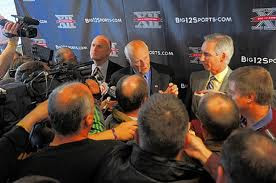"All the news that's fit to link"

"All the news that's fit to link"
Tuesday, May 29, 2012
Thoughts and links after the long weekend
The long Memorial Day weekend was so powerful and enchanting that even realignment hysteria seemed to take a few days off.
After a few head-spinning weeks, you tend to reach a point of saturation so it's good to step away and decompress.
But here we are, and this topic certainly doesn't figure to go away anytime soon. It's going to ramp right back up with this week's Big 12 conference meetings in Kansas City.
Don't expect expansion to be talked about in any official way. Do expect people in power to continue saying things like "not in any formal way." As this guy points out, it's not as though Florida State, Clemson and Notre Dame are going to show up with their resumes and interview.
From my vantage point, these meetings are important because all the Big 12 presidents are getting together. So you have to think there will be some serious discussions going on in private, and one would conclude that some of the good information-gatherers out there would produce some insights from those conversations.
This morning's most interesting read comes from Rick Gosselin of the Dallas Morning News. Gosselin writes a column on the remarkable job done by Chuck Neinas, who took over a conference on life support late last summer and played an integral role in the Big 12 becoming a power again.
Gosselin notes that Neinas sees no need for the Big 12 to rush into any expansion, and he gives an explanation that I hadn't previously considered:
There are lessons to be learned from the near collapse of the conference. The initial merger of the Big Eight and Southwest Conference created too many factions, too many rifts that were allowed to fester. The old Big 12 could never get all of its schools pulling in the same direction. There were too many different agendas.
Neinas would like to see all 10 of the schools in the newly reconfigured Big 12 prove they can get along before any more kids are invited into the sandbox.
“People have to understand that bigger is not necessarily better,” Neinas said. “What we are trying to do, in view of what has transpired in the past, is to build unity. We have two new members. Let the membership be comfortable with each other before they ever consider going forward.
“We’ve taken care of the contentious issues. We have a very workable solution. Let’s build on that, then down the road maybe think of expansion. But to automatically run off and say, they’re going to go to 12 or 14 or whatever — that does not take into account where this conference was, where we’ve come from and where we need to go.”
A lot of folks think it's a foregone conclusion that the Big 12 expands from 10 to 12 because of all the loot available with a championship game. But whether it goes beyond 12 seems highly uncertain if you believe what Neinas says publicly.
“I’ve talked to some of my colleagues in the ACC and SEC who tell me 14 is unwieldy,” Neinas said. “You talk about disrupting tradition — North Carolina and North Carolina State will now play basketball once a year. What happened to Tobacco Road?
“The situation has become cumbersome. If you’re at 14 you may as well go to 16 because then you can have two eight-team divisions. But then that’s not a conference. That becomes a scheduling convenience, not a conference.”
More on the Big 12 meetings in the Kansas City Star.
Florida State continues to say it hasn't heard anything from the Big 12. But the Seminoles are hurting financially.
The FSU athletics department's board of directors approved earlier this month a 2012-13 budget that contains a $2.4-million shortfall.
Apparently, Florida State's money woes run even deeper than that. The Democrat has learned that the department is unlikely to balance its 2011-12 budget, which closes June 30.
FSU's budget issues will get a boost from the Atlantic Coast Conference's new television deal with ESPN/ABC that will pay each school an average of $17.1 million annually - a significant jump from the $12.9 million league teams received this past year.
But the ACC payouts will not jump to that $17.1 million payout in the first year of the contract and will instead escalate annually beginning with a $1.2 million increase this year.
The Big 12's current contract pays out about $15 million annually. But according to the terms of their entry to the conference, new members West Virginia and TCU only receive 50 percent of what other league schools are paid this year. It will take several years of escalating payments until the two schools earn a full share.
That revenue sharing - as well as a $20-million buyout from the ACC - would be a key focus of negotiations should FSU consider a move to the Big 12.
And at the SEC meetings, Steve Spurrier promotes a divisive agenda.
LW
Subscribe to:
Post Comments (Atom)

No comments:
Post a Comment